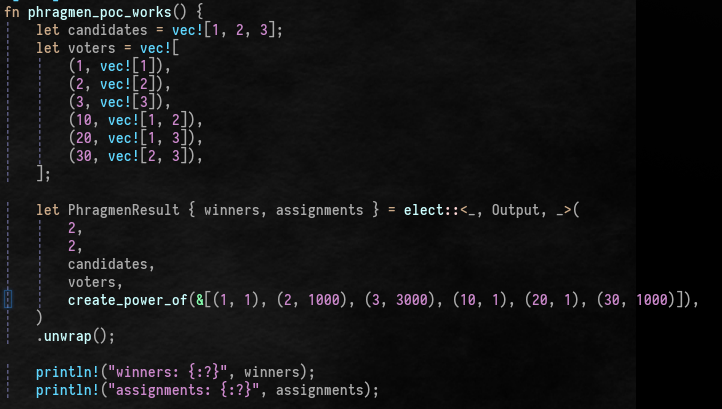NPoS
Antonio
yanganto@github
yanganto@itering.com
2020/03/24
Nominated Proof-of-Stake
An efficient consensus
Take Back Web
By participate in
Role in Web
- Content/Service Provider
- Content/Service Consumer
- Infrastructure Provider
Benefit as Infra Provider
- Share security on chain
- Server location as you need
Join the Web
And more deep in
Techical View
Technical Evolution
| Before Web | Web 1, 2 | Web 3 | |
| Application | Program | App | Dapp/ Smart Contract |
| Abstract | OS & ABI | Service & API | Runtime/ EVM |
| Infra | Bare Metal | Servers | Consensus Network |
Consensus Network
- Multiple servers by different ownner → Network
- Work together → Consensus
Consensus
- One node at one slot
- PoW - By power of work competition
- PoS - By turn from nodes with Staking
- NPos - By turn from a small group
Problems
a small group but decentralized
Role in NPoS
- Validator
- Nominator
- Chill

One to Many

Easy, But Not Fair

16
6
8
4.5
5.5
4 Validators
- Secure
- Distribute to Fair
- Total Maximize

Not Fair

11
11
10
8

14
14
6
6
Total: 40
Total: 40
Not Fair / Fair

9
9
6
6
10
10
9
9
14
14
6
6
Total: 30
Total: 40
Total: 37
Fair

Total: 40
Total: 37
Phragmen
-
Find validator
- base on score (votes * staking value)
-
Redistribution the budget(votes * staking value)
- balance on staking of validator and try to fair
Following not real equation
but it helps you to memorize
Example







Winner:
Assignments:
Example 1






Winner:
Assignments:
- Validator view: 1:3
- Half Fair: 1:1.5
- Result: 1.5 : 1 (3:2)
Staking:1, 1000, 3000, 1, 1, 1000
Vote: (1), (2), (3), (1,2), (1,3), (2,3)
Example 2
Winner: [(3, 5001), (2, 2001)]
Assignments: [
(2, [(2, Perbill(1000000000))]),
(3, [(3, Perbill(1000000000))]),
(10, [(2, Perbill(1000000000))]),
(20, [(3, Perbill(1000000000))]),
(30, [(2, Perbill(666555575)), (3, Perbill(333444425))])]
Staking:1, 1000, 4000, 1, 1, 1000
Vote: (1), (2), (3), (1,2), (1,3), (2,3)
- Validator view: 1:4
- Half Fair : 1:2
- Result: 2 : 1
Example 3
Winner: [(3, 6001), (2, 2001)]
Assignments: [
(2, [(2, Perbill(1000000000))]),
(3, [(3, Perbill(1000000000))]),
(10, [(2, Perbill(1000000000))]),
(20, [(3, Perbill(1000000000))]),
(30, [(2, Perbill(714183689)), (3, Perbill(285816311))])]
Staking:1, 1000, 5000, 1, 1, 1000
Vote: (1), (2), (3), (1,2), (1,3), (2,3)
- Validator view: 1:5
- Half Fair : 1:2.5
- Result: 2.5 : 1
714183689/285816311 = 2.49875063638338
Example 4
Winner: [(3, 7001), (2, 2001)]
Assignments: [
(2, [(2, Perbill(1000000000))]),
(3, [(3, Perbill(1000000000))]),
(10, [(2, Perbill(1000000000))]),
(20, [(3, Perbill(1000000000))]),
(30, [(2, Perbill(749906262)), (3, Perbill(250093738))])]
Staking:1, 1000, 6000, 1, 1, 1000
Vote: (1), (2), (3), (1,2), (1,3), (2,3)
- Validator view: 1:6
- Half Fair : 1:3
- Be Fair: 3:1
Operation Details
Benefit & Duty
Validator
- Producing Blocks
- Bound Valuable
- Set benefit ratio
- validator : nominator
- Slash when fail, then become chill
Nominator
- Chose the better Validators
- Bound Valuable
- Slash when validator fail
Darwinia
Dual Token Staking
Ring
- General valuable
- Bound 3 ~ 36 months to get Kton
- 10000 Ring 1 year → 1Kton
- Now & Future
Kton
- Long term valuable
- Pay for unbound penalty
- Past


Why we concern Past ?
Votes & Benefit
- Hard Threshold of Ring
- Rule of Benefit Distribution
- Half for Ring, Half for Kton
- Validator First
- Nominator After